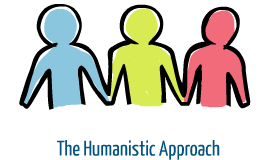Humanistic Psychology
Humanism is a psychological approach that emphasizes the study of the whole person. Humanistic psychologists look at human behavior not only through the eyes of the observer, but through the eyes of the person doing the behaving-“Self Actualization”.
The humanistic approach in psychology developed as a rebellion against what some psychologists saw as the limitations of the behaviorist and psycho-dynamic psychology. The humanistic approach is thus often called the “third force” in psychology after psychoanalysis and behaviorism (Maslow, 1968). Humanistic psychologists argue that objective reality is less important than a person’s subjective perception and understanding of the world.The general aim of humanistic therapy is to give a holistic description of the person. By using phenomenological, inter subjective and first person categories, the humanistic psychologist attempts to glimpse the whole person and not just fragmented parts of the personality (Rowan 2001).
There are several factors which distinguish the Humanistic Approach from other approaches within psychology, including the emphasis on subjective meaning, a rejection of determinism, and a concern for positive growth rather than pathology. While one might argue that some psycho dynamic theories provide a vision of healthy growth (including Jung’s concept of individuation), the other characteristics distinguish the Humanistic Approach from every other approach within psychology (and sometimes lead theorists from other approaches to say the Humanistic Approach is not a science at all).
Most psychologists believe that behavior can only be understood objectively (by an impartial observer), but the humanists argue that this results in concluding that an individual is incapable of understanding their own behavior–a view which they see as both paradoxical and dangerous to well-being. Instead, humanists like Rogers argue that the meaning of behavior is essentially personal and subjective; they further argue that accepting this idea is not unscientific, because ultimately all individuals are subjective: what makes science reliable is not that scientists are purely objective, but that the nature of observed events can be agreed upon by different observers (a process Rogers calls inter subjective verification).
There are levels of necessities for a human to live a content life. Most importantly, Primary( Food, sex, clothes). There are terms like Self- actualization, Esteem, Love, safety, and physiology that also determines our behavior. Not only mind and body but these factors also determine our reaction and responses to situations. Situations, surrounding, consequences play a major role in our social life and most importantly interactions. There are levels of requirements to achieve before we can gain “Self-actualization”.
Humanistic psychology expanded its influence throughout the 1970 s and the 1980 s. Its impact can be understood in terms of three major areas:
1) It offered a new set of values for approaching an understanding of human nature and the human condition.
2) It offered an expanded horizon of methods of inquiry in the study of human behavior.
3) It offered a broader range of more effective methods in the professional practice of psychotherapy.
Impacts on Science and Society
Benefits Of Humanistic Psychology
- People have more positive outlook towards different people. Less ethnocentrism.
- Promotes uniqueness, freedom and individuality.
- Helps remove some of the stigma attached to therapy and made it more acceptable for normal, healthy individuals to explore their strengths and
 potentials.
potentials. - Make people more productive, energetic, and empowered by gaining confidence about their own psychological, biological, physical assets.
- Optimistic people make better society, workplace and healthy nations all together.
Challenges of Humanistic Psychology
- Observations are unverifiable. No accurate way to measure such qualities.
- Being able to define “self-actualization”, “fully-functioning” are too vague.
- Contributions of genetics and childhood experience are largely ignored.
- The optimism can be too much for therapy purpose.
- Too much assumptions are left on behavior than scientific research.